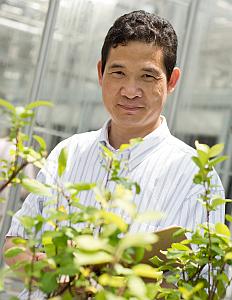American Fruit Grower Contributor Receives Presidential Early Career Award

Kenong Xu (Photo credit: Robyn Wishna/Cornell University)
Kenong Xu, assistant professor, Cornell University, American Fruit Grower® and Western Fruit Grower® contributor, and a National Institute of Food and Agriculture grantee, is one of the three USDA researchers who will receive the Presidential Early Career Awards for Scientists and Engineers. Renee Arias, National Peanut Research Laboratory, and Matthew Thompson, Rocky Mountain Research Station were also USDA award winners. The awards will be presented this Spring in a Washington, DC ceremony.
Xu, assistant professor in the Horticulture Section of the School of Integrative Plant Science, was one of only three agricultural researchers honored.
President Obama named 105 researchers as recipients of the highest honor bestowed by the United States Government on science and engineering professionals in the early stages of their independent research careers. The Presidential Early Career Awards highlight the key role that the Administration places in encouraging and accelerating American innovation to grow our economy and tackle our greatest challenges. The awards, established by President Clinton in 1996, are coordinated by the Office of Science and Technology Policy within the Executive Office of the President. Awardees are selected for their pursuit of innovative research at the frontiers of science and technology and their commitment to community service as demonstrated through scientific leadership, public education, or community outreach.
Based at the New York Agricultural Experiment Station (NYSAES) in Geneva, N.Y., Xu’s current research focuses on identifying the apple genes and gene networks that control characteristics such as tree form, resistance to stress and fruit color, acidity and shelf life.
Xu’s research is on tree fruit genomics in the Department of Horticulture at New York State Agricultural Experiment Station, Cornell University. He developed two educational modules focusing on apple genetics and genomics ─ The apple genome and its importance to New York growers and Genetics of apple fruit acidity. He is currently working on several research projects including NIFA’s Agriculture and Food Research Initiative grant on Elucidating the Genetic and Molecular Mechanisms of Apple Fruit Acidity. His goal is to discover and characterize apple genes or gene networks controlling traits of horticultural and the economic importance using tools of plant genomics.
This allows apple breeders to save time and money when they develop new varieties, because they don’t have to wait for apple seedlings to fruit to identify which of the progeny carry the traits they’re looking for. And they can discard undesirable seedlings at a very young stage, greatly reducing costs.
“Xu is demonstrating how we can apply new insights into how plants work to make them more adaptable to a changing world and evolving consumer needs,” says Alan Collmer, director of the School of Integrative Plant Science.
“These early-career scientists are leading the way in our efforts to confront and understand challenges from climate change to our health and wellness,” President Obama said. “We congratulate these accomplished individuals and encourage them to continue to serve as an example of the incredible promise and ingenuity of the American people.”
The winners will receive their awards at a Washington, DC, ceremony this spring.










